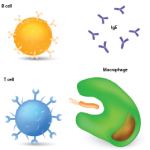Epratuzumab is a humanized anti-CD22 that also induces B-cell depletion, although the depletion is less pronounced than with anti-CD20 and is preferentially of naive and transitional B cells. However, anti-CD22 also blocks the activation and proliferation of B cells, possibly acting as a negative regulator of B-cell function. A recent Immunomedics press release regarding a phase IIb trial of epratuzumab in SLE reported superior response rates compared with placebo at Week 12.
Inhibition of B-cell activation and survival is another strategy for targeting the B-cell compartment. This approach could include blockade of costimulatory interactions that promote B-cell activation (e.g., anti-CD40L or CTLA4-Ig) or neutralization of B-cell survival factors/cytokines, such as B cell–activating factor belonging to the TNF family (BAFF). Belimumab is a fully human monoclonal antibody against BAFF. After initial encouraging results in a phase II trial in SLE, two phase III trials were initiated, have recently completed recruitment, and preliminary press releases from Human Genome Sciences and GlaxoSmithKline have reported favorable clinical responses compared with placebo (based on a composite SLE responder index). Given these initial reports, we should consider whether BAFF blockade would be expected to yield different results compared with anti-CD20. Indeed, this would be surprising given that both agents deplete B cells, with anti-CD20 causing even more pronounced B-cell depletion and likely better depletion of memory B-cell subsets. On the other hand, BAFF blockade may have additional effects on other immune cells important in SLE, including T cells and dendritic cells. Moreover, rituximab causes a compensatory increase in BAFF, which may theoretically have adverse effects on B-cell selection. Nevertheless, I suspect that the distinct trial results with BAFF blockade versus anti- CD20 in SLE are more related to trial design than biologic differences between the two therapies.
Another potential explanation for the disappointing results of B-cell depletion in SLE is the lack of effect on autoantibodies and long-lived plasma cells. Atacicept is a receptor fusion protein that blocks both BAFF and its related cytokine APRIL and may be unique in its dramatic effects on plasma cells, with reductions in total immunoglobulin (Ig) G, IgM, and autoantibodies in phase I studies in both RA and SLE.8 Because of its effects on plasma cells, transmembrane activator and calcium-modulating and cyclophilin ligand interactor (TACI)-Ig would appear to have great potential in autoantibody-mediated diseases. However, the challenge will be to eliminate autoantibody-producing plasma cells without increasing the risk of infection due to adverse effects on protective antibodies.
